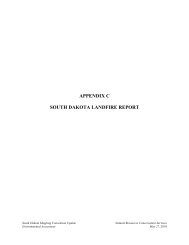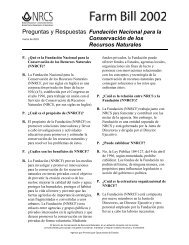Pilot Project for Value-Added Product Development from Solid ...
Pilot Project for Value-Added Product Development from Solid ...
Pilot Project for Value-Added Product Development from Solid ...
Create successful ePaper yourself
Turn your PDF publications into a flip-book with our unique Google optimized e-Paper software.
<strong>Pilot</strong> <strong>Project</strong> <strong>for</strong> <strong>Value</strong>-added <strong>Product</strong> <strong>Development</strong> <strong>from</strong> <strong>Solid</strong> Waste<br />
Generated on Swine Farms<br />
Super Soil Systems USA, Inc.<br />
Final Report<br />
October 14, 2009<br />
Overview<br />
Complete solutions to farm waste management include mechanisms <strong>for</strong> nutrient removal<br />
and alternative use outside the intensive production region. The Super Soil waste treatment<br />
system provides such a solution <strong>for</strong> swine production by flocculating, dewatering, and<br />
removing solids <strong>from</strong> the liquid waste stream. Approximately 50% of Total Nitrogen, 75%<br />
of Total Phosphorus, and 98% of Copper and Zinc in the waste stream are removed with<br />
the solids. The remaining water is treated further to remove soluble nitrogen and<br />
phosphorus. At the end of the process, the liquid has been sterilized and contains little or<br />
no nitrogen, phosphorus, copper, and zinc. Odor and ammonia emissions are also<br />
significantly reduced.<br />
<strong>Solid</strong>s removed <strong>from</strong> the waste stream are transported to a Central Processing Facility<br />
where they are composted to kill pathogens and further reduce ammonia emissions and<br />
odor. By the end of the process, nutrients are stable and the compost meets “Class A”<br />
standards set by State and Federal regulations.<br />
To enhance value of the composted waste, and provide market alternatives, Super Soil<br />
manufactures value-added products <strong>from</strong> two different compost products made <strong>from</strong> swine<br />
solids. Funding <strong>from</strong> the CIG project was used to purchase a grinder and develop a<br />
mixing/bagging line that could be used to automate production and provide <strong>for</strong> bulk sales<br />
and bagging. Since Super Soil’s goal is to develop several value-added products <strong>from</strong><br />
compost, flexibility was a major concern in development of the mixing/bagging line.<br />
By purchasing a combination of new and refurbished equipment, Super Soil was able to<br />
purchase a grinder <strong>for</strong> particle size reduction and install a computerized mixing/bagging<br />
line including two 10 yd hoppers, two 4 yd hoppers, three small chemical hoppers, a<br />
mixing head and conveyors to move product <strong>from</strong> beginning of the line to a separate<br />
conveyor <strong>for</strong> bulk loading or bagging. A bagging system consist of a product hopper and<br />
bag filling head <strong>for</strong> both one and two cu ft bags, a sealer, and conveyor to move the<br />
product through bagging, sealing, and stacking/palletizing <strong>for</strong> shipping. The line will<br />
process up to 60-70 cu yd/hr bulk or bags at the rate of 12-14 two cu ft bags or 18-20 one<br />
cu ft bags/min. Since processing is very efficient, orders are processed on demand and<br />
product inventory is minimized.<br />
76
















